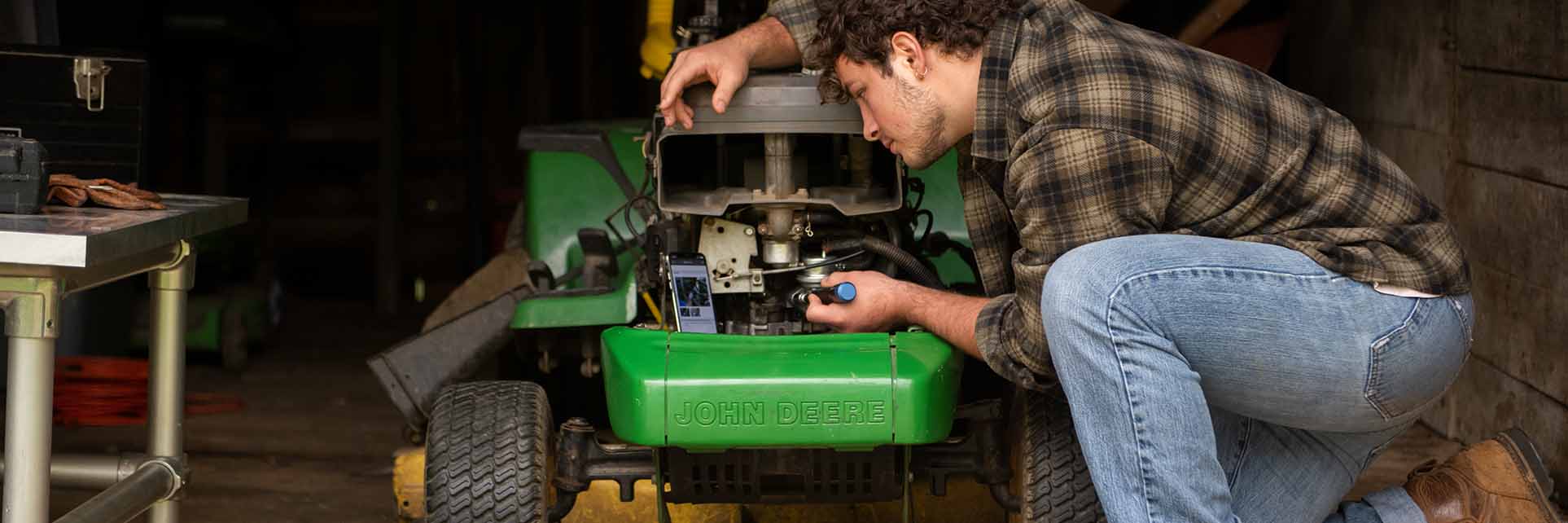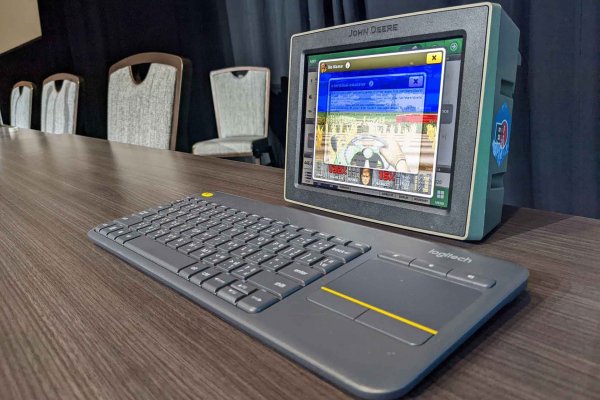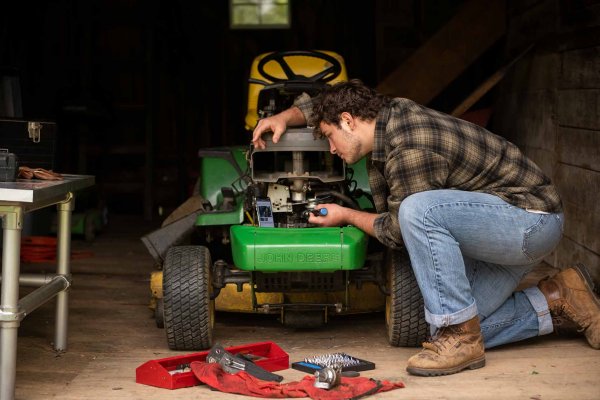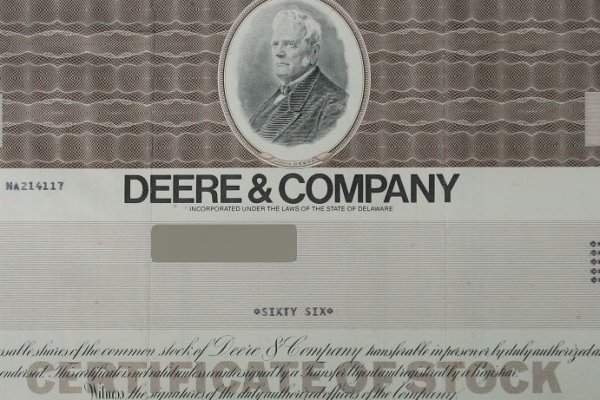After nearly a decade fighting Right to Repair laws around the United States, John Deere just made their biggest concession yet: They promised farmers that they’ll provide the documentation and software needed to fix tractors and other heavy farm equipment, again.
On Sunday, the American Farm Bureau Federation (AFBF) signed a Memorandum of Understanding (MOU) with Deere. In the MOU, Deere says that they will ensure farmers and independent repair shops will have access to manuals, on-board diagnostics, and the same diagnostic software that their dealerships use. If Deere makes good on their promises, this could be a huge win for farmers.
However, the agreement comes at a price: In turn, AFBF has promised to encourage its state organizations to “refrain from introducing, promoting, or supporting federal or state ‘Right to Repair’ legislation that imposes obligations beyond the commitments in this MOU.” And farmers who want to fix their own equipment might very well need to go beyond the commitments of the MOU, which has some big limitations. It is unclear whether it gives farmers access to the fully privileged Service ADVISOR software that dealers use (more on that later) and the payload files needed to activate spare parts. Through this agreement, the AFBF has promised not to fight for any of those other pieces of repair access, although their separate state organizations could continue the fight.
Meanwhile, the agreement is essentially toothless—there’s no way for farmers to hold Deere accountable for the promises they’ve made, no means for redressing any failure to meet the terms of the MOU. And historically, Deere has been really, verifiably, terribly bad about making good on its repair promises. Plus, at any point, Deere can choose to terminate the agreement in 30 days (if, for instance, they get tired of farmers complaining about Right to Repair).
In short, farmers have won some theoretical repair rights today, and we’re cheering with them. But we’ll need to keep a close eye on Deere. Without courts to keep Deere honest, farmers will have to rely on media and public opinion. Meanwhile, iFixit and the rest of our friends and farmers in the Right to Repair coalition will continue to fight for a true Right to Repair law.
How We Got Here
Deere has been arguing since 2015 that because the equipment they sell runs on code, farmers don’t really own their tractors—they just have “an implied license for the life of the vehicle to operate the vehicle.” Through lobbyists, Deere has spent many millions of dollars making this argument over and over again, in statehouses and in front of the US Copyright Office. For a while, Deere had a leg to stand on: Section 1201 of the Digital Millennium Copyright Act prohibits getting around the kind of digital locks that stand in the way of repairing a modern electronically controlled tractor. But the Copyright Office has granted—and renewed, every three years—an exemption to Section 1201 that legalizes tractor repair. For farmers who want to repair their own things, that exemption was the first step to restoring the ownership rights that electronic tractors have taken away.
And although the Copyright Office has confirmed it’s legal to fix your own tractor, Deere has thrown a field of caltrops in the way. Over and over, Deere has worked to consolidate their control of the US farm equipment market: As of 2021, they controlled 53% of the market for large tractors and 60% of the market for farm combines. Increasingly, repairing Deere equipment requires access to diagnostic software and repair ‘payloads’ (the rest of the world calls this firmware) that only dealers have. One farmer reported that a single instance of equipment downtime while waiting for a dealer to input a code cost him $30,000-$60,000. Yet farmers report dwindling access to dealership repair services; each Deere dealership serves 5.3 million acres of American farmland.
So, will this MOU help?
Lots of Promises
The basic promises of this MOU sound similar to the agricultural Right to Repair legislation that has been proposed around the country. Deere has pledged to provide “electronic access to Manufacturer’s Tools, Specialty Tools, Software and Documentation,” including software, manuals, training, on-board diagnostics, and service bulletins. One assumes this also includes part firmware “payloads.”
The agreement specifically promises access to “Manufacturer’s Codes and Data,” which it defines as “information necessary to be transmitted to a Farmer’s Agricultural Equipment in order to maintain, repair, or activate the Agricultural Equipment.” Should Deere keep this promise, it ought to solve farmers’ biggest repair complaint—machines that get stuck in a nonfunctional “limp mode” when a repair is completed without a manufacturer code.
John Deere has several levels of software and access, and farmers have complained that the simplistic “Customer Service ADVISOR” software provides insufficient access. But the agreement requires that manufacturers provide the same tooling to farmers that their dealers have:
“If Manufacturer provides to Authorized Repair Facilities any Tools, Specialty Tools, Software and Documentation for functions listed in Subsection A.1., separately or as fully or partially integrated Software, Manufacturer shall ensure that these are available to Farmers on a Fair and Reasonable basis.” (emphasis added)
Will farmers have access to all of the permissions and capabilities within that software that the Authorized Repair Facilities have? The letter of this agreement appears to say that they will. The document is somewhat internally inconsistent, repeatedly referring to ‘Customer Service ADVISOR,’ the tool that does not meet farmer needs. But if section §II.B.1 is to be believed, John Deere has committed to providing farmers with the full suite of repair capabilities that their dealerships have.
They promise to provide these things on “fair and reasonable terms.” If this were legislation, an Attorney General could judge whether the cost of the software to independent repair shops and individual farmers is fair and reasonable, compared to dealers’ cost for the same software. As it is, we have to trust that Deere will meet the “equitable” terms they promise.
Historically, John Deere’s pricing has disadvantaged small farmers who can’t afford to pay the same price for repair software and tools for one machine that larger farms can purchase once and reuse across their entire fleet. The price of this access will be key to determining whether AFBF has represented their members’ needs.

What’s in a Memorandum?
If this whole “memorandum of understanding” thing seems familiar, that’s because we’ve been here before. In 2012, Massachusetts voters approved the nation’s first Right to Repair law, requiring automotive manufacturers to use nonproprietary diagnostics hardware, so that independent shops could service cars. After the Massachusetts auto right to repair law passed, the automakers signed an agreement to apply the law nationwide.
Advocates were enthusiastic when the agreement was signed, but the relationship quickly turned sour. Automakers took advantage of loopholes in the law to move repair interfaces to the cloud using wireless “telematics,” cutting local mechanics out of the next generation of repair software. Because the auto repair MOU had no enforcement mechanism, this disagreement grew until the Auto Care Association was forced to re-introduce legislation in 2020 to close the loophole. They went back to the voters and secured a second Right to Repair law to cover wireless repair software. Voters were not amused by manufacturer monopoly tactics, approving the initiative by an overwhelming 75% majority.
Areas for Improvement
Just like the automotive MOU, this Farm Bureau agreement has no enforcement mechanism. It is very likely that states will seek to pass laws to hold agricultural equipment manufacturers to account. Anthony Schutz, a law professor at the Nebraska College of Law, tweeted, “My legal brain says this is a strange way to create legal rights (also, I don’t think it does).”
Somewhat surprisingly, the national Farm Bureau only negotiated this agreement with John Deere. The manufacturer coalition opposing Right to Repair includes Case, New Holland, Kubota, and others. This anti-repair video put out by the Association of Equipment Manufacturers clearly features equipment from a number of manufacturers. Repairs are increasingly a problem in all computerized equipment, and while Deere has been the most notorious example, farmers have difficulty getting repair software across the board.
The best way for farmers to achieve equality of access for all equipment brands is to pass a law standardizing this access across the industry, just like New York’s new Right to Repair law is going to level the playing field for consumer electronics repair.
The Right to Repair legislative experts at the Repair Association were not involved in the negotiation around this MOU. If Right to Repair advocates and the farmers they work with had been consulted, they would have focused on tightening up the definitions around software access, permissions levels, access to payload files, and fair and reasonable pricing.
Paving the Way For Legislation
For years, manufacturers have fought requirements to provide farmers with the tools they need to fix equipment. They’ve argued that it would undermine the cybersecurity of their equipment. They told the Copyright Office that farmers might pirate Taylor Swift music on their tractors. They’ve even argued that farmers would violate emissions regulations if they could restore their machines back to operational efficiency.
This agreement shows that all of those arguments were bogus, and that there are no substantive obstacles for farmers to fix their equipment. This piece of paper is about as enforceable as any other piece of paper lying around your house. But it is an important first step, and it will pave the way for the legislation that will guarantee farmers’ ownership rights for generations to come.
Farmers simply want to fix their stuff. Let’s get some laws on the books to make sure they can, no matter what color their equipment is.






6 Comments
And in the bike industry, the surging of electronic shifting is creating a huge mess for riders trying to fix and maintain their own equipment. SRAM is supposedly slightly better in supporting their customers, yet Shimano is pricing diagnostic equipment out of reach of most riders. And swapping parts is strongly discouraged.
RobCow - Reply
Interesting Rob. I was thinking of changing to an electronic changer but I guess I will hang on to my all manual changer for a while yet. This is really bad news considering cyclists do a lot, if not most of their own repairs. Its a necessity, unless you like getting stuck in nowhere land and walking a lot.
Peter Braithwaite -
My grandfather used Deere equipment. My uncle and cousins used Deere equipment. I've used and owned Deere equipment. One of my cousins managed the Southeastern parts depot for Deere when he retired. My father was a zone rep for Deere. Based on the way the Deere zone rep treated me on warranty for a 333D compact track loader I will never buy another piece of Deere equipment. Within one year after I was stiffed on warranty on the 333D I bought a Volvo 250 excavator, two Bobcat T870 compact track loaders and two Bobcat utility vehicles. All of those would have been Deere if the warranty on the 333D bad engine had been honored. So, based on that experience I suspect that Deere is highly likely to not honor a commitment to allow owner repair.
Paul Bunce - Reply
Tractor manufacturers need to KNOW!
Farmers have rope, pitchforks, torches ,Hot Tar and a $@$* load of feathers.
PS. They typically don't care much for LAWYERS either
John - Reply
This is not worth the paper it is written on. Their lawyers already know what loopholes they will exploit and how they will maneuver around to keep the farmers from self repair. They will NEVER abide by this agreement until force by the government. If you want this agreement to be useful print it out and use it to start a fire in your fireplace.
Jason Browder - Reply